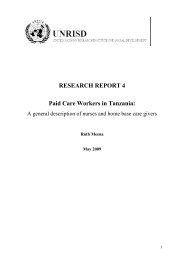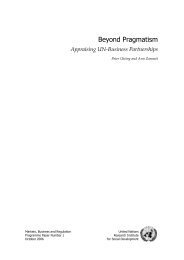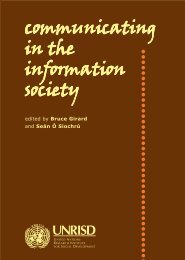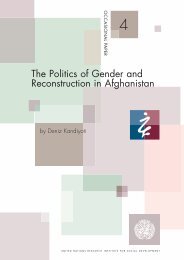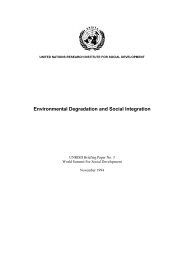Women's Employment - United Nations Research Institute for Social ...
Women's Employment - United Nations Research Institute for Social ...
Women's Employment - United Nations Research Institute for Social ...
You also want an ePaper? Increase the reach of your titles
YUMPU automatically turns print PDFs into web optimized ePapers that Google loves.
Women’s employment in the textile manufacturing sectors of Bangladesh and Morocco<br />
where labour costs are already among the lowest and where the<br />
working environment is in dire need of improvement, any such<br />
endeavour is bound to make the Bangladeshi manufacturer vulnerable<br />
to new types of non-tariff barriers in the name of humanitarian<br />
concerns, as happened earlier on the issue of child labour (Nahar,<br />
1996). There<strong>for</strong>e, <strong>for</strong> their enlightened self-interest, the RMG<br />
manufacturers from Bangladesh must find some ways of minimizing<br />
production costs without heavily clamping down on wages and<br />
guillotining the facilities available to the labour <strong>for</strong>ce. Their success<br />
in this respect would ultimately depend on whether or not they<br />
succeed in striking a balance between wage structures, the working<br />
environment and labour-management relations on the one hand, and<br />
labour productivity on the other. It is in this context that one has to<br />
consider the role of trade unions in the RMG manufacturing sector in<br />
Bangladesh. Although the post-Cold War debates on the consequences<br />
of globalization <strong>for</strong> trade and industrial policy re<strong>for</strong>ms in developing<br />
countries seem to be far from settled, there is a growing consensus<br />
that those issues cannot be addressed in isolation from the broader<br />
debate on labour standards, trade unions and gender equity (Çagatay,<br />
1996; Standing, 1989, 1990; Olukoshi, 1996; Khundker, 1997).<br />
1. Relevance of the study<br />
News reports published in leading vernacular and English<br />
dailies of the country in recent years suggest an increasing trend of<br />
physical assaults, gherao, demonstrations, rallies, work stoppages and<br />
lay-offs in the ready-made garment sector. Such “unhealthy”<br />
management-labour relations result in loss of wages <strong>for</strong> workers as<br />
well as loss of productivity. If no new modus operandi is evolved <strong>for</strong><br />
institutionally resolving labour disputes, these could do incalculable<br />
damage to management-labour relations and the morale of both. Since<br />
it has not been possible, so far, to quantify the loss directly attributed<br />
to the existing poor industrial relations in the RMG sector, the specific<br />
impact of these deteriorating relations is still going largely unrecorded.<br />
Despite the obvious problematic state of management-labour<br />
relations in the RMG enterprises in Bangladesh, no systematic ef<strong>for</strong>t<br />
has so far been made to understand the basic dynamics of industrial<br />
relations in the private sector in general and the problems of<br />
unionization in the female-dominated RMG sector in particular. There<br />
might be various reasons <strong>for</strong> an apparent lack of academic interest in<br />
management-labour relations in the private sector. However, the<br />
single most important reason seems to be that, so far, the role of the<br />
182




